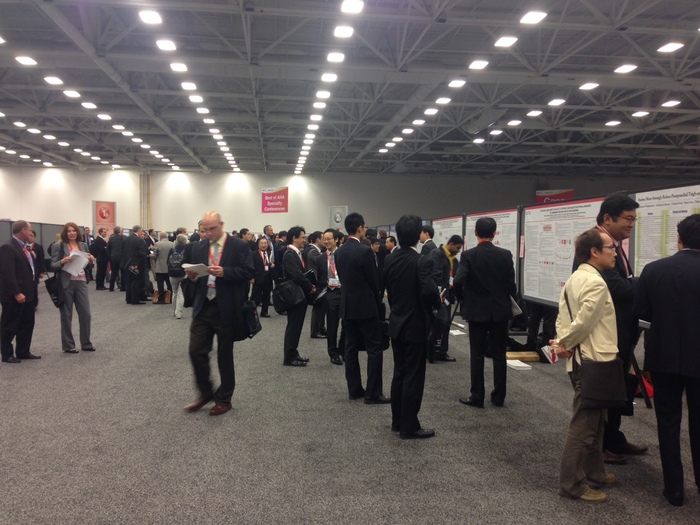November 20th, 2013
AHA.13: Good until the End
Seth Shay Martin, MD
Several Cardiology Fellows who are attending AHA.13 in Dallas this week are blogging for CardioExchange. The Fellows include Vimal Ramjee, Siqin Ye, Seth Martin, Reva Balakrishnan, and Saurav Chatterjee. You can find the previous post here. For more of our AHA.13 coverage of late-breaking clinical trials, interviews with the authors of the most important research, and blogs from our fellows on the most interesting presentations at the meeting, check out our AHA.13 Headquarters.
While the Exhibit Hall was closing down, the poster hall was still buzzing Tuesday afternoon at AHA.13. Here’s what it looked like:
Did anyone else stop by the side-by-side posters by Peter P. Toth on PCSK9 inhibition? The titles say it all:
- Alirocumab, a Proprotein Convertase Subtilisin/Kexin Type 9 Monoclonal Antibody, Reduces Sterol Concentrations of All Serum Low-Density Lipoprotein Cholesterol Fractions
- Alirocumab, a Proprotein Convertase Subtilisin/Kexin Type 9 Monoclonal Antibody, Reduces Triglycerides and Cholesterol Concentrations of Serum Remnant Lipoprotein Fractions and Very Low-Density Lipoproteins
Dr. Toth presented post-hoc analyses using samples from the three alirocumab phase 2 trials in heterozygous FH and non-FH patients. Lipoproteins were subfractionated by Vertical Auto Profile (VAP) testing.The reduction in remnants and VLDL-C by PCSK9 inhibition with alirocumab is both shocking and exciting. Given what we’ve known about the mechanism of action (increasing availability of LDL receptors), we all expected the robust LDL-C reductions, but not the remnant and VLDL-C reduction. How VLDL-C and RLP-C subfractions are been reduced is not yet known; these fascinating results deserve further research to better understand what is going on. To lipidologists, this seems to be a very sexy drug. I am very hopeful that these lipid changes will translate into improved clinical outcomes in the ODYSSEY phase 3 trial program of alirocumab!
Are you hopeful about this new approach?

